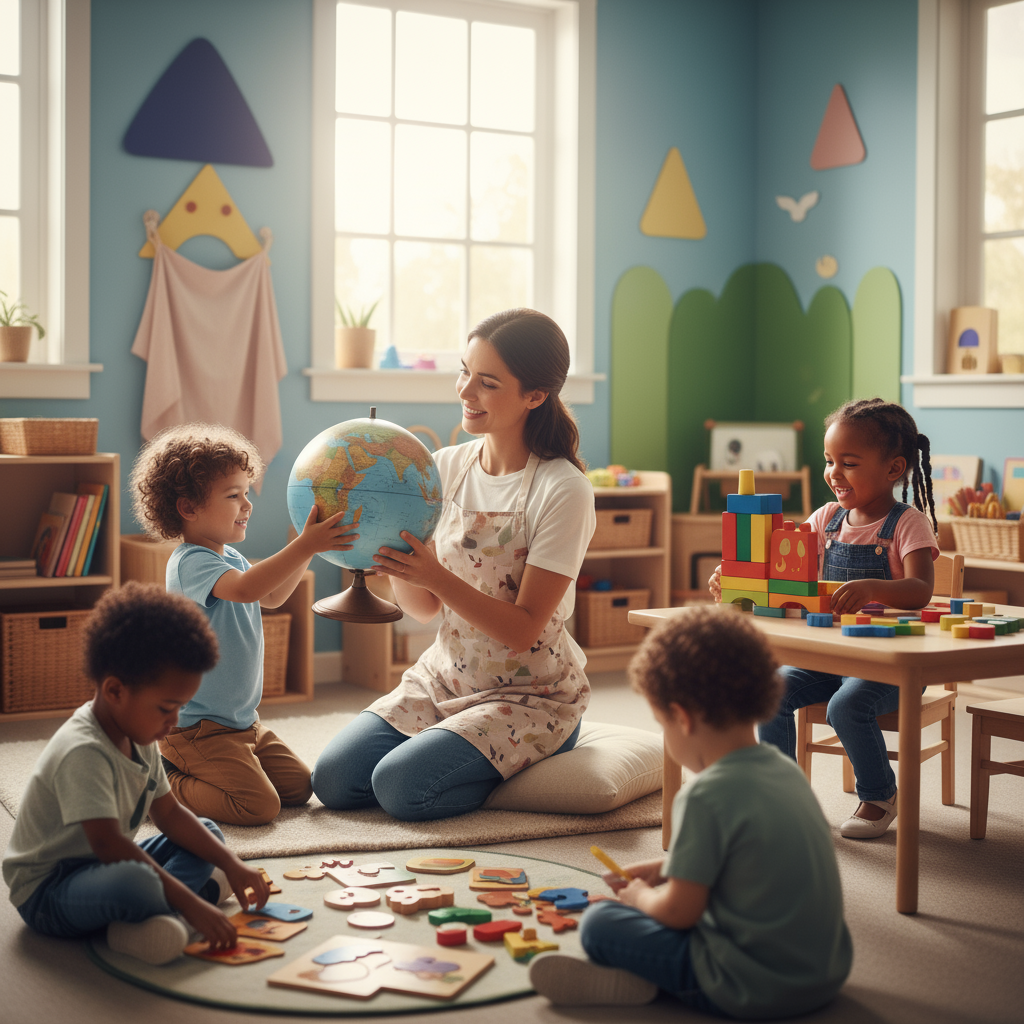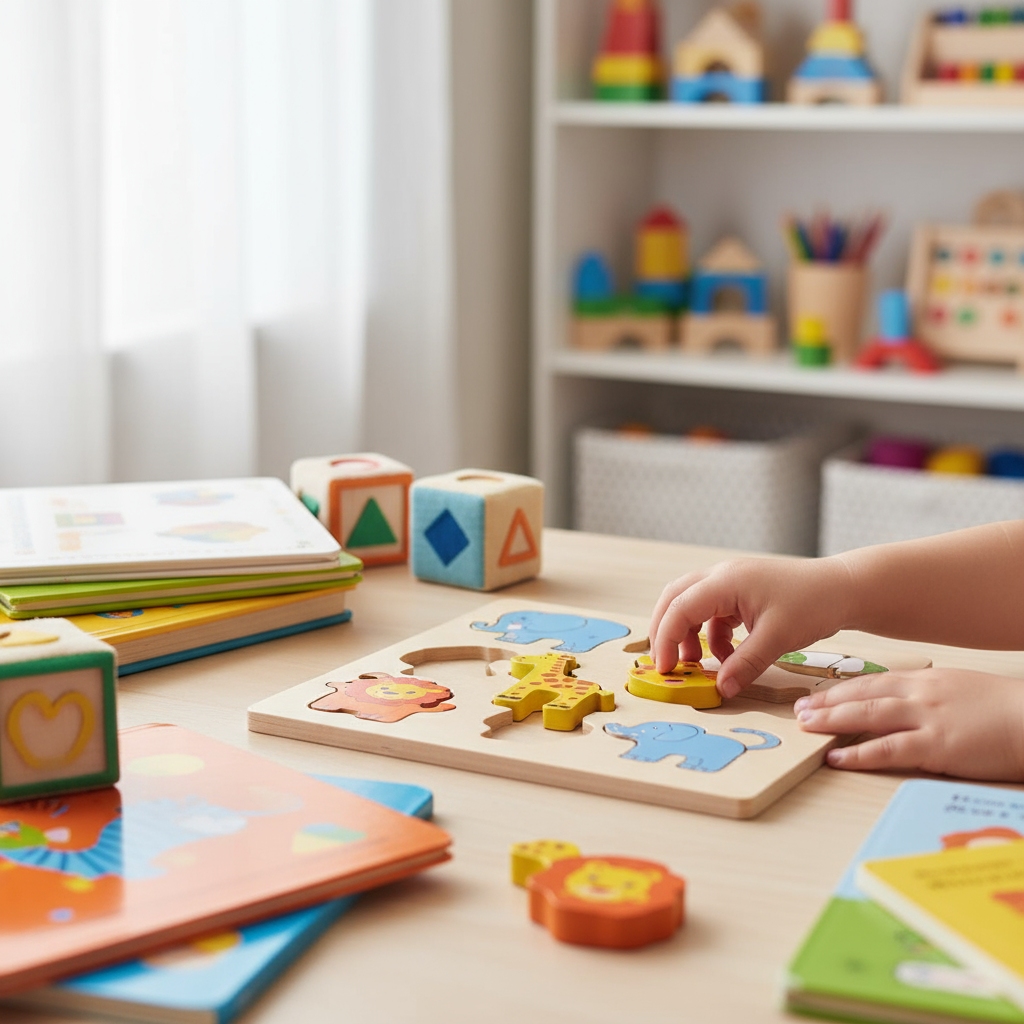
Table of Contents
Introduction
Those first few years? They’re everything. Early childhood is when the magic happens—when tiny humans begin making sense of the world around them, one curious question and clumsy step at a time. You’ve probably watched a toddler discover something new and thought, “Wow, their brain is like a little sponge.” And you’re absolutely right. What happens during these formative years doesn’t just influence how children learn—it shapes who they become.
Here’s what’s fascinating about early childhood education: it’s not just about teaching kids their ABCs or how to count to ten. Research shows that children who experience quality early education programs don’t just perform better in school (though they do). They develop stronger social skills, show greater emotional resilience, and carry these advantages throughout their entire lives. Think of it like building a house—you want that foundation to be rock solid. During these early years, children’s brains are forming essential connections that will influence everything from problem-solving to language development to emotional regulation. That’s where parental involvement in education becomes crucial. When you’re actively engaged in your child’s learning journey, you’re not just boosting their academic outcomes—you’re strengthening that emotional bond and fueling their natural motivation to explore and learn.
Now, every family is different. What works for your neighbor’s kid might not work for yours, and that’s perfectly okay. The key is finding your groove with positive parenting techniques that create a safe, nurturing environment where your child feels comfortable expressing themselves. Understanding different parenting styles can help you figure out what approach resonates with your family’s values and your child’s unique personality. When children feel secure and supported, they’re more likely to take healthy social risks, build meaningful relationships, and develop the emotional intelligence they’ll need throughout life.
But here’s something many people don’t realize: early childhood education goes way beyond academics. There’s a powerful connection between education and mental health—supportive learning environments actually contribute to emotional stability and resilience in children. And let’s talk about nutrition for a moment. You know how cranky kids get when they’re hungry? Well, it turns out the link between nutrition and mental health runs much deeper than we used to think. The right foods can actually enhance cognitive development and help regulate mood, giving your child’s brain the fuel it needs to learn and grow.
What You’ll Learn in This Guide
Ready to dive in? This guide will walk you through everything you need to know about why early childhood education matters so much for your child’s success and happiness. We’ll explore the real benefits, break down the key developmental areas, and share practical tips you can use right away. Here’s what we’ll cover together:
- Benefits of Early Education: Discover how early learning experiences stimulate cognitive, social, and emotional growth—and why this sets children up for long-term success and wellbeing.
- Key Development Areas: We’ll explore the core areas like language development, motor skills, and social interaction, plus how each piece fits into your child’s overall growth.
- Impact on Future Success: Learn about the lasting influence early education has on everything from career prospects to social relationships and lifelong learning habits.
- Tips for Parents and Educators: Get actionable advice on creating enriching learning spaces, encouraging positive social interactions, and staying on top of developmental milestones without stress.
As we work through this together, you’ll gain a deeper understanding of what makes early childhood education such a game-changer. We’ll also talk about when it might be time to seek professional guidance if you have concerns about your child’s development. (And remember—asking questions and seeking support is a sign of great parenting, not a weakness.) This knowledge will help you become a confident advocate for your child and ensure they get the resources and support they deserve.
Throughout this guide, we’ll focus on evidence-based strategies and insights from educational experts, but we’ll present everything in a way that actually makes sense for busy parents and caregivers. You’ll find yourself coming back to key concepts like parental involvement in education and positive parenting techniques, because these aren’t just theoretical ideas—they’re practical tools you can start using today.
Whether you’re just starting to think about early childhood education or you’re looking to refine your current approach, this guide is written with you in mind. No jargon, no complicated theories—just clear, helpful information delivered with warmth and understanding. Because at the end of the day, we’re all just trying to give our kids the best possible start in life.

Here’s something every parent and educator should know: those early years matter more than you might realize. We’re talking about a window of opportunity that shapes how children think, feel, and connect with the world around them. Sure, early childhood education teaches kids their ABCs and how to count to ten. But the real magic? It’s building the foundation for everything that comes after—from how they solve problems to how they handle their emotions when things get tough.
Benefits of Early Childhood Education
Let’s get real about what early childhood education actually does for kids. Think of a young child’s brain like a superhighway under construction—those neural pathways are forming at lightning speed, and quality education acts like the best road crew you could ask for. When we give children rich learning experiences during these crucial years, we’re literally helping their brains wire themselves for success. And here’s where it gets interesting: the role of parental involvement in education can’t be overstated. When parents and teachers work together, children don’t just learn—they thrive.
But cognitive development is only part of the story. Watch kids in a quality early learning program, and you’ll see something beautiful happening. They’re learning to share (even when they really don’t want to). They’re figuring out how to use their words when they’re frustrated instead of melting down. They’re building emotional muscles that will serve them well into adulthood. Research consistently shows that children who experience quality early education are more likely to graduate high school and stay engaged in learning throughout their lives. What’s fascinating is how how parenting styles interact with formal education—it’s like watching two powerful forces combine to shape a child’s development.
Key Aspects of Benefits of Early Childhood Education
Here’s what makes early childhood education so powerful for young learners:
- Cognitive Development: Picture a three-year-old working a puzzle, completely absorbed in figuring out where each piece goes. That’s brain building in action. Through carefully designed activities, children strengthen their memory, sharpen their focus, and develop logical thinking skills that will help them tackle everything from math problems to life challenges.
- Social and Emotional Benefits: Ever seen preschoolers negotiate who gets the red crayon? It might look like child’s play, but they’re actually mastering skills many adults struggle with—sharing, empathy, and working together toward a common goal. These experiences teach them to manage their emotions and build the confidence to try new things.
- Long-Term Academic Success: Children who attend quality early education programs consistently outperform their peers in reading and math as they progress through school. It’s like giving them a head start in a race that continues for years—they begin kindergarten ready to learn, not struggling to catch up.
- Parental Engagement Enhancement: When parents actively participate in their child’s early education, something magical happens. The learning doesn’t stop at pickup time. Instead, it becomes part of daily life, with parents reinforcing skills at home and providing the emotional support that helps everything click into place.
When you understand these benefits, it’s clear why early childhood education deserves our attention and investment. Armed with this knowledge, parents and educators can work together to give children the strongest possible foundation. Now, let’s explore the specific areas where this development takes place.
Key Areas of Development in Early Childhood Education
Quality early childhood programs don’t just wing it—they focus on specific developmental areas that research shows make the biggest difference. Language and literacy development takes center stage, and for good reason. When children hear rich vocabulary, engage with stories, and play with sounds and letters, they’re building the tools they’ll need for a lifetime of communication and learning. Think beyond just reading skills here—we’re talking about giving children the power to express their thoughts, understand others, and navigate an increasingly complex world.
Then there’s the physical side of development, which is often underestimated. Watch children on a playground, and you’re seeing important learning in action. Those wobbly first steps on a balance beam? That’s developing coordination and confidence. The careful work of threading beads or using scissors? That’s building the fine motor skills they’ll need for writing and countless other tasks. And don’t overlook the social learning happening every day. When children work together on a project, share materials, or comfort a friend who’s upset, they’re developing emotional intelligence that will serve them throughout their lives. For educators looking to structure these experiences effectively, understanding lesson plan creation can help ensure that every activity serves a developmental purpose.
Key Aspects of Key Areas of Development
Here are the core developmental areas that effective early childhood programs target:
- Language and Literacy: From singing songs with rhyming words to hearing the same story read multiple times, children absorb language naturally when it’s presented in engaging, interactive ways. These experiences build vocabulary, develop listening skills, and create positive associations with reading that last a lifetime.
- Physical and Motor Skills: Whether it’s learning to pedal a tricycle or mastering the art of using a glue stick, children develop both large and small muscle groups through purposeful play. These skills support everything from handwriting to sports participation and overall physical health.
- Social Skills and Interaction: Group activities teach children the give-and-take of relationships—how to wait their turn, how to include others, and how to recognize when someone needs help. These aren’t just “nice to have” skills; they’re essential for success in school and life.
- Structured Learning Environment: The physical space matters more than you might think. When learning areas are thoughtfully designed with age-appropriate materials and clear purposes, children become independent learners who can choose activities, solve problems, and take pride in their accomplishments.

Here’s the truth about early childhood education: it’s so much more than teaching kids their ABCs and 123s. We’re talking about building the foundation for everything that comes next in your child’s life. Think of it like constructing a house—you wouldn’t skimp on the foundation, right? Those early years are when your little one’s brain is making connections at lightning speed, developing problem-solving skills that’ll serve them for decades. It’s pretty incredible when you think about it.
But here’s what really gets me excited about quality early education—it’s not just about the academics. Your child is learning how to be human. They’re figuring out how to communicate, how to bounce back when things don’t go their way, and how to play nicely with others. (Trust me, that last one is harder than it sounds!) These social and emotional skills? They’re the secret sauce that helps kids succeed not just in school, but in life.
Now, let’s talk about the long-term payoff. The research is clear: kids who get quality early education tend to do better in school, graduate at higher rates, and land better jobs as adults. We’re talking about real, measurable benefits that last a lifetime. Plus, there’s an economic angle here that’s pretty compelling—early education boosts earning potential and creates well-rounded individuals who contribute positively to society. When you look at language development, motor skills, and social growth all working together, it becomes obvious why a well-rounded approach matters so much.
So how do you make this happen? It starts with understanding what your child needs to thrive. Language and literacy, physical development, social skills—these aren’t separate boxes to check off. They’re all connected, and when you focus on creating rich learning experiences that touch on each area, magic happens. Your child builds confidence, becomes more independent, and (here’s my favorite part) develops a genuine love for learning that’ll stick with them forever.
Ready to take action? The good news is you don’t need a teaching degree to make a huge difference. Start by creating supportive environments both at home and wherever your child learns. Building strong, respectful relationships through positive parenting techniques goes a long way. Want to boost your child’s motivation and academic success? Check out our guide on parental involvement in education—it’s packed with practical strategies. And if you’re curious about your own parenting approach, our parenting styles quiz can help you understand your family’s unique dynamic and tailor your approach accordingly.
There’s something else worth considering: the connection between education and mental health. When kids feel supported in their learning environment, they develop emotional resilience that prepares them for whatever life throws their way. It’s fascinating stuff, really. If you want to dive deeper into how educational practices shape long-term mental health outcomes, this external resource on education and mental health offers some eye-opening insights.
You’ve got the knowledge. You’ve got the resources. Now it’s time to create that nurturing pathway for your child’s educational journey. Whether you’re a first-time parent feeling a bit overwhelmed (totally normal, by the way), our guide on tips for first time dads offers practical advice and encouragement. And if you’re navigating parenthood solo, you’re not alone—our comprehensive guide to single parent support groups can connect you with the community and support you deserve. The investment you make today in understanding and fostering early childhood education? It’s one of the best gifts you can give the next generation.
Frequently Asked Questions
-
What age range does early childhood education cover?
- Typically from birth to 8 years old, covering infancy through early elementary years.
-
How does early education benefit brain development?
- Early learning stimulates neural connections essential for lifelong cognitive skills.
-
What are some signs a child may need extra support?
- Delays in speech, motor skills, or social interaction may indicate a need for professional help.
-
Can parents contribute effectively to early education?
- Yes, parents play a crucial role by creating enriching environments and encouraging learning.
-
Why is early childhood education important for social skills?
- It helps children learn cooperation, empathy, and communication essential for healthy relationships.


